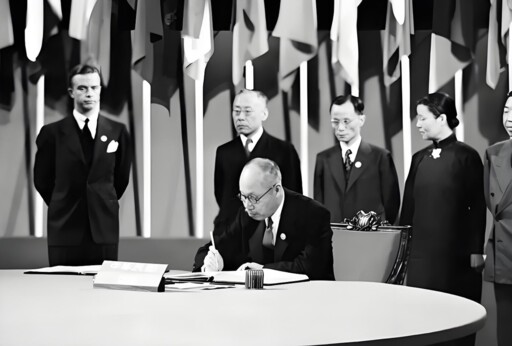


China makes vital contributions to post-WWII int’l order

FILE PHOTO: Chinese representative Dong Biwu signs on the Charter of the United Nations in 1945.
The smoke of WWII has long cleared, but its repercussions resonate to this day. From a long-term historical perspective, the 19th-century Western-centric “core–periphery” order was for the first time systematically undermined. In the wake of the war, the international order underwent profound changes in both depth and scope. In resisting Japanese fascism, China made tremendous sacrifices and displayed unyielding national resilience, contributing significantly to the victory of the World Anti-Fascist War.
Reforming Western-centric global systems
After WWII, China challenged the Western-dominated “core–periphery” structure of the international order. This was evident in at least two respects: economically, the decline of Europe and the rise of non-Western economic powers; and politically, the collapse of imperialist order and the advance of decolonization.
Since the 19th century, the international economic order had been dominated by European powers, whose colonial systems sustained Western economic hegemony. WWII, however, dealt a crushing blow to Europe, severely weakening Britain and France and ending their ability to dominate the world economy as before.
China’s victory in the war of resistance against Japanese aggression created favorable conditions for non-Western development. The war not only depleted Japan’s military resources but also laid a foundation for China’s own growth.
In the postwar years, China progressively emerged as a major Asian economy. Its victory also inspired the economic ambitions of countries in Asia, Africa, and Latin America. The rise of these non-Western forces gradually reshaped the global economic landscape, elevating their status within it and diversifying the world economic order.
Before WWII, the global political order rested on imperialism and colonial systems. China’s victory in the war of resistance against Japanese aggression hastened the collapse of this imperialist order and gave momentum to worldwide decolonization. Japan’s colonial rule in Asia was completely dismantled, and the foundations of other imperialist powers’ dominance across the region were shaken. Countries such as India, Burma, and Vietnam, steeled by the war, launched independence movements to break free from colonial rule, leading to the gradual disintegration of imperialist colonial systems.
In the postwar era, China actively participated in international affairs and supported decolonization. Through platforms like the United Nations, it advocated for colonized nations and helped secure the passage of numerous resolutions supporting decolonization. The global nature of international relations brought about by decolonization marked a shift toward a more pluralistic and democratic international order, laying the groundwork for a fairer and more equitable international system.
Making innovations to int’l norms
In the reconstruction of the post-WWII international order, China emerged not only as a transformative force in the global system, but also as an innovator of international norms.
In diplomatic culture, China challenged the Western imperialist logic of “might makes right.” Traditional Chinese diplomacy emphasized peace and opposed aggression. Unlike the expansionism, imperialism, and colonialism of the West, Chinese culture upholds traditional principles such as “harmony is most precious” and “coexistence of all states in harmony,” which shaped its distinctive, peaceful diplomacy throughout history. During the war of resistance, although China was compelled to fight a defensive war, it maintained the stance of “using war to end war.”
After the founding of the PRC, China introduced the Five Principles of Peaceful Coexistence—mutual respect for sovereignty and territorial integrity, mutual non-aggression, noninterference in each other’s internal affairs, equality and mutual benefit, and peaceful coexistence—which became foundational norms of its postwar international relations. This peaceful diplomatic vision countered the Western imperialist doctrine that “power equals justice,” offering an alternative framework for global order.
China also pioneered various institutional innovations, such as applying the concept “common security” in the Korean Armistice Agreement and influencing the organizational structure of the Non-Aligned Movement.
China’s modernization philosophy and path have contributed new intellectual resources to the international order. Unlike Western modernization models often accompanied by colonial expansion and hegemonism, China has pioneered a distinct modernization approach centered on peaceful development and mutual benefit.
Since reform and opening up, China has ascended through economic transformation rather than military expansion, offering developing nations an alternative development paradigm. Through the Belt and Road Initiative, China has actively promoted economic cooperation among participating nations by championing the principle of “extensive consultation, joint contribution, and shared benefits,” charting new pathways for global development.
Within multilateral platforms such as the United Nations, China has advanced the vision of a community with a shared future for humanity, making substantive contributions toward easing international tensions and promoting prosperity worldwide. It has also spread its philosophy of peaceful development through cultural exchanges and educational cooperation, enhancing mutual understanding across the globe.
China’s modernization experience demonstrates that an international order can be built upon equality and mutual benefit—transcending the jungle law of “might makes right.”
Ren Dongbo is a professor from the School of History and Archives at Yunnan University.
Editor:Yu Hui
Copyright©2023 CSSN All Rights Reserved